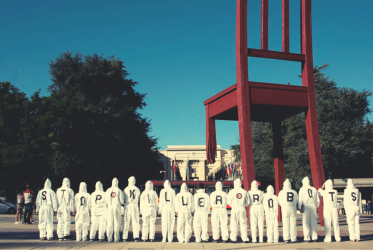His Excellency
Mr Kim Jong-il
Chairman of the National Defence Commission
Democratic People’s Republic of Korea
His Excellency
Mr Yukio Hatoyama
Prime minister, Japan
His Excellency Mr Hu Jintao
President
People's Republic of China
His Excellency
Mr Lee Myung-bak
President
Republic of Korea
His Excellency
Mr Dmitry Medvedev
President, Russian Federation
His Excellency
Mr Barack Obama
President
United States of America
Geneva, 12 November 2009
Excellencies,
I take this opportunity to write to you all as heads of state government that are involved in the Six-Party Talks related to issues on the Korean peninsula. I have had an opportunity to lead a World Council of Churches delegation to visit the Democratic People’s Republic of Korea (DPRK) from 17 to 20 October 2009 at the invitation of the Korean Christian Federation. This visit was also an opportunity for me and my delegation to meet with the President of the Supreme People’s Assembly of the DPRK, Mr. Kim Yong-nam, and other government officials who were present at the meeting.
Immediately after the DPRK visit I participated in an international consultation we organized on “Peace, Reconciliation and Reunification of the Korean Peninsula”, which was held in Hong Kong from 21 to 23 October 2009. This international consultation, attended by 137 participants from more than 30 countries, included representatives from WCC member churches from each country in the Six-Party Talks. The member churches of the WCC have pursued peace and reconciliation in the Korean peninsula for several decades. In fact, in 1984 the WCC began a process to establish engagement and dialogue for peace and reconciliation in response to peace and security on the Korean peninsula.
For the past 25 years through this initiative, the WCC has accompanied churches on the Korean peninsula and beyond in opening dialogue and contact which helped facilitate direct contact between North and South Koreans who are burdened by this prolonged conflict. The goal of this facilitation is to generate understanding, build confidence and trust, develop relationships and open avenues for constructive service in North and South Korea. Through our various involvements in both North and South Korea we have been convinced that the people of both Koreas have a compelling longing for peace and a wish that their respective governments may pursue peace with direct engagement between all parties in order to build confidence, relationships and constructive actions for the well-being, dignity and security of all the people of the Korean peninsula.
Excellencies, we want to convey to you the alarm and disappointment we feel concerning the breakdown of the Six-Party Talks which has led to actions that escalate tensions and confrontation. Our attention and prayers are drawn at this time to the urgent need to resume the Six-Party Talks in a manner that is comprehensive and conclusive. We urge each of you to return to the negotiating table prepared to deal with the difficult but eminently solvable issues before you. We especially express our considered opinion that it is essential for all parties to demonstrate good faith in negotiations and in the implementation and verification of what has been agreed. We value the responses we receive from time to time which demonstrate that our sentiments are shared by many in civil society, at the national and international levels.
Given the resurgent vision of a world free of nuclear weapons, it is time to make the Korean peninsula a setting for successful disarmament rather than a focus of regional instability and international failure. Given the fact that five of the six parties are recognized nuclear-weapon-states or are protected by such states, it is difficult to resolve in isolation the evident commitment of the DPRK in adopting a similar, armaments-driven posture. We are of the opinion that initial and continuing steps toward a nuclear-weapon-free world, under the terms of the Nuclear Non-Proliferation Treaty, would greatly facilitate progress in the Six-Party Talks in the short term and would act as a unique safeguard against the erosion of any new agreements. The most convincing steps imaginable at present would be taking bold and concrete steps towards a nuclear-weapon-free Korean peninsula and ultimately a nuclear-weapon-free zone in Northeast Asia. As an incentive for progress of this calibre, we urge that direct talks between the United States of America (USA) and the DPRK be undertaken in the context of the Six-Party Talks. Such engagement must be set in motion at the earliest, as it needs to be seen as an essential part of multilateral success and the prelude for the much larger decisions which would lead to ultimate peace and security on the Korean peninsula.
Excellencies, we are aware of the fact that negotiations which could build a lasting peace in the Korean peninsula are within your governments’ power. This letter is an encouragement to hold bilateral talks between the DPRK and the USA and to commence multilateral engagement between all other countries involved in the Six Party Talks – the DPRK, the US, the Republic of Korea, the People’s Republic of China, the Russian Federation and Japan.
Sincerely yours,
Rev. Dr Samuel Kobia
WCC general secretary


